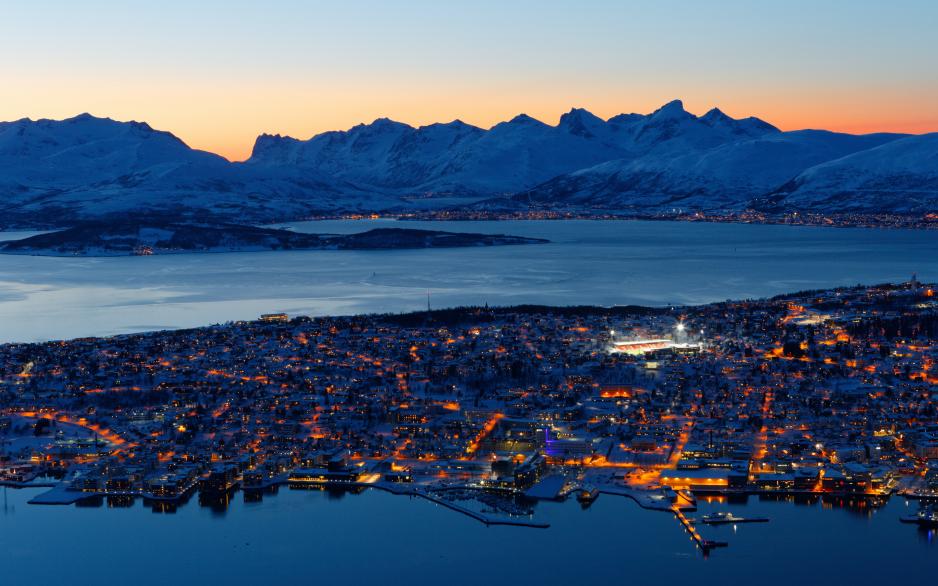"If Globalization Slows Down, the Impact is Felt Twice as Hard in the Arctic"

Adjusted for seasonal variations, projections show that mainland GDP in Norway fell 6.4 percent in March compared to the previous year. (Photo: Harry Jaschhof on Unsplash)
Arctic Economic Council Chairman Heidar Gudjonsson is optimistic about international cooperation and trade among the Arctic nations, but he is worried about the economic ramifications forced upon the High North by Covid-19.
We are just seeing the beginning of the economic downturn caused by the coronavirus pandemic. Adjusted for seasonal variations, projections show that mainland GDP in Norway fell 6.4 percent in March compared to the previous year. Mainland Norway's GDP is projected to be around 14 percent lower at the end of March than at the beginning of the month according to preliminary numbers from Statistics Norway.
Heidar Gudjonsson, Arctic Economic Council (AEC) Chairman, Iceland tells High North News that since the Arctic is a small homogenous export-driven area, the region is particularly affected by the slowdown in international business.
How has the pandemic affected AECs partners?
"It is very dependent on the geographic location of the partner, and also which kind of industry the partner is in. Partners that are in the oil and gas industry are experiencing huge ramifications which we currently do not see the end of. Partners that are in the fishing sector are not particularly affected by the pandemic. The shipping sector and the commodity sector are also experiencing a downturn", he tells High North News, and continues:
"It has been said that climate change is twice as significant in the Arctic as it is elsewhere on the planet. The same holds true for globalization. If that slows down, the impact is felt twice as hard in the Arctic."
Which of the Arctic countries is most vulnerable?
"If you compare Norway, Sweden and Finland, Norway is very exposed to oil and gas. Norway are also doing more business in the Arctic, so they are much more affected than Sweden and Finland economically. If you look towards Iceland, Greenland, the US and Canada, there are also significant differences. Iceland has been very much affected given the size of the tourism industry, Greenland on the other hand is much less affected", he says, and adds:
"Depending on which area you look at in Canada and the US, the remote areas are much less affected than heavily populated areas regarding health issues, but might be more affected economically."
Which industries do you think we should focus on in the Arctic in the future?
"Tourism in the Arctic has been growing a lot, it has been growing faster than other industries in the region. But now there is no tourism, absolutely none. So it is hard to rely on tourism to be growing in the short term future. So business in the Arctic need to diversify more", the Chairman says, and elaborates:
"What we have been seeing happening is that when big scale infrastructure like airports or ports are built to support a big mine or oil exploration, then this infrastructure can be used for other things, so investments like this makes it easier to diversify."
The same holds true for globalization. If that slows down, the impact is felt twice as hard in the Arctic.
What do you think about the future of international cooperation and international relations after this crisis, are you an optimist or a pessimist?
"The Arctic area is quite homogenous. If you for example compare Moscow to Washington or Toronto to Oslo, the people living in the Arctic have many more things in common, than people living in these capital cities. For the Arctic people to relate to the issues each of us is facing is easier. Free trade among the Arctic nations and in the pan-Arctic area is much easier to foresee, than free trade between Moscow and Washington. Free trade between Kirkenes and Murmansk is much easier to manage, than free trade between Moscow and Oslo", he says.
Free trade among the Arctic nations and in the pan-Arctic area is much easier to foresee
What do you think will be the long-term consequences of the pandemic for the Arctic?
"Right now it is very difficult to forecast even three months ahead, so it is hard to make any predictions.The Arctic is very reliant on international business. The exports of the High North are quite undiversified. We export energy in the form of oil and gas, and fish which is basically energy for humans. And in return we need to import wheat, rice and other goods that we need", he says, and adds:
"Even though the health of the people living in the Arctic is not as compromised as people living in in more populated areas of the world, the Arctic economy is perhaps more in jeopardy."
The Arctic economy is perhaps more in jeopardy.
How has the pandemic affected the Arctic Economic Council?
"We have not been able to participate in any conferences, but the day to day business has not been affected. The working groups are having meetings remotely, and our board meetings are always conference calls, so day to day operations in the Arctic Economic Council are going as usual. We had to postpone our annual meeting which was to take place in May in St. Petersburg. It will hopefully now take place in September", he says in closing.


